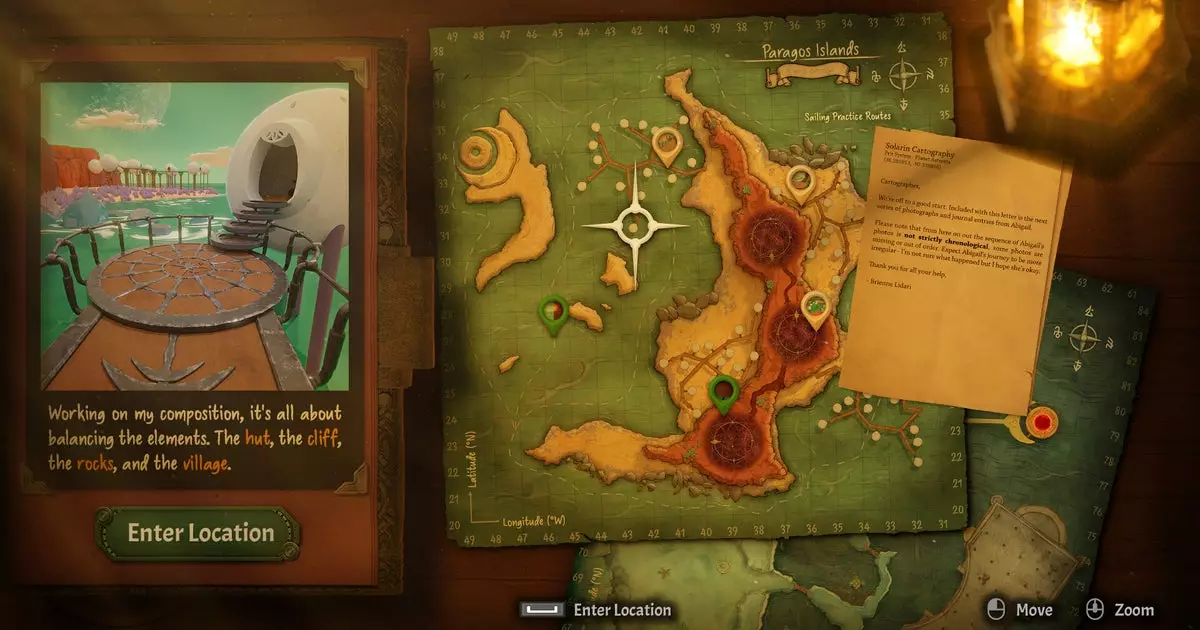“Locator,” while drawing inspirations from titles like “Obra Dinn” and “Golden Idol,” carves a unique niche within the gaming landscape by marrying detective storytelling with cartography in an alien realm. Players take on the role of an interstellar cartographer, not merely wandering through a fantastical world but embarking on a quest to locate a missing archaeologist named Abigail Lidari. This intertwining of character-driven narrative and environmental exploration sets the stage for an immersive experience. By placing players in a position of both investigator and artist, “Locator” offers a compelling exploration of the themes of isolation, perception, and the nature of knowledge.
At its core, “Locator” relies on players’ observational and deductive skills. Drawing parallels to the popular browser game “Geoguessr,” players must analyze visual cues from Abigail’s photographs and her intentionally cryptic journal entries to deduce her whereabouts. The act of pinning locations on beautifully crafted maps serves not only as a gameplay mechanic but also as a metaphor for the human experience of navigating through uncertainty and unfamiliarity. This dual function of gameplay keeps players engaged, as they seamlessly transition from solving light puzzles to delving deeper into Abigail’s psyche.
What’s noteworthy is how the game employs geographical elements methodically; environmental landmarks become symbols of Abigail’s emotional journey. The initial stages might present straightforward geographical challenges, but as players progress, the puzzles require introspection and empathy, transforming the experience into a thoughtful investigation rather than a mere scavenger hunt.
Exploration in “Locator” promises to extend beyond simple navigation; it engages players in a mental exercise, compelling them to view the alien landscapes through Abigail’s eyes. For instance, puzzles revolving around the identification of cyclopean statues, which she affectionately names, reflect her unique interactions with her surroundings. This element sheds light on the game’s fundamental premise: the connection between individual perspective and environmental perception. Abigail’s personal touches—doodles and notes—humanize what could otherwise feel like an abstract quest, grounding her experiences in a relatable way.
This innovative approach encourages players to consider the layered meanings behind their actions. As the developers describe, “Locator” combines spatial reasoning with logical deduction, providing a platform not just for skillful navigation but for a deeper understanding of the character’s isolation and longing.
Moreover, “Locator” invites philosophical reflections on the nature of maps themselves. The concept of “cartographer’s folly,” or fabricated entries in maps, resonates with broader themes of reality versus representation. Alfred Korzybski’s famous quote—”the map is not the territory”—is a salient reminder of how the search for Abigail is as much about understanding her world as it is about the pursuit of truth. Players are left to grapple with the limitations of their own interpretations while navigating the alien terrain, enriching the gaming experience.
Despite its charming aesthetic and intriguing gameplay mechanics, “Locator” still awaits a release date, keeping the anticipation alive. As players gear up to explore this beautiful yet enigmatic universe, they prepare not just for a game but for a profound journey into the psyche of a solitary explorer on a distant world.


Leave a Reply